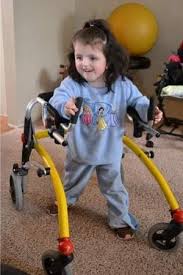LifeNews is reporting on the story of Brad Smith, a father of five from Rochester Hills, Michigan whose daughter Faith was born with Trisomy 18, a condition considerably worse than Trisomy 21 (Down Syndrome) in which 90 percent of its victims die within a year of birth.
Trisomy 18 results from having three copies of the chromosome 18 in each cell of the body rather than the usual two copies. Also known as Edward's syndrome, it causes abnormalities throughout the body, such as heart defects and other organ problems. Distinctive features of the condition include a small and abnormally shaped head, small jaw and mouth, and clenched fists. Because these children have so many life-threatening medical problems, most die before or right after birth. Only five to 10 percent of these children live past their first year, and those who do often have severe intellectual disabilities.
Faith Hill was one of that small percentage of children born with Trisomy 18 who survived past her first year. She was about 2.5 years old when she began to have serious illnesses that almost claimed her life several times. In each case, the hospital where she was being treated helped her to survive by doing what the family thought was the same necessary care that would have been provided to any other child.
It wasn't until the family had an opportunity to speak with former Senator Rick Santorum, whose daughter Bella also has Trisomy 18, that they learned about all the care their daughter was not receiving.
Smith made a list of all the things being done for Bella and took it to the hospital later that day to ask the doctor why these treatments weren't being offer to his daughter.
"When we showed this list to the doctors, they told us that NOBODY does this," Smith wrote.
It wasn't until after the third hospital visit and another near-death experience for Faith that they realized the truth - the doctor and the hospital simply weren't treating Faith the same way they would treat another child in her condition. But what they discovered next was almost too bad to be true.
 Smith's wife, Jesi, was researching Trisomy 18 in medical journals when she discovered the term Slow Code.
Smith's wife, Jesi, was researching Trisomy 18 in medical journals when she discovered the term Slow Code.
"Slow Code is when the medical providers offer the appearance of treatment, but knowingly administer the treatment so slowly that it is useless to the patient. This may sound crazy and like something we might make up. We not only learned the term from their industry journals, but we experienced it," Smith writes.
Why do we know about Code Blue but never hear a word about Code Slow?
"Hospitals hide this practice in a deceitful way so they can inflict their decision on the patient. This is not care, but lethal neglect or intentional death which I have always termed murder," Smith wrote.
In one article of the Journal of Perinatology, a pediatric ethics committee discussed an option of Slow Code as a possible solution in the case of an infant with poor prognosis, Smith reports.
"So here we have a committee of medical 'caregivers' suggesting that forms of care should not even be offered to patients based upon their value(less) judgment. Withholding medical care and suggestions for treatment is now the medically ethical way to handle a patient? In the end, this particular committee decided that it is deceitful to use Slow Code. Ya think? The fact that this suggestion was even considered legitimate enough to be discussed is troubling."
However, the Smith family learned that knowledge is power. Their daughter Faith was suffering from severe sleep apnea and when they confronted their doctor about it, he finally admitted that if he was in their shoes, he would take Faith to another hospital for better treatment.
They took his advice and brought Faith to another hospital where she was tested and then fitted for a device that helps her to breathe better at night.
" . . .(T)hey could not understand why we were not provided with this help for our daughter," Smith writes.
The good news is that Faith is now 5 years old and doing things that the first group of doctors said would never be possible.
"Well, they were right about one thing," Smith says. "She never would have started walking or probably even have survived had we followed their advice, or lack thereof."
For more information on this subject, visit Smith's blogspot.
© All Rights Reserved, Living His Life Abundantly®/Women of Grace® http://www.womenofgrace.com

